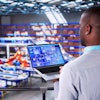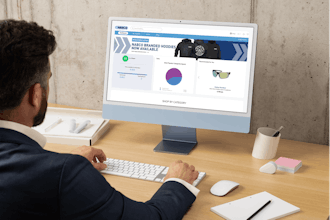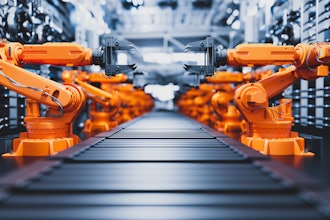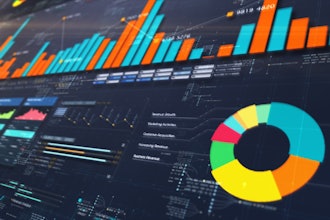
The pandemic has reinforced how truly fragile the industrial supply chain can be, which is why distributors need to gain full digital control over their supply chains/distribution channels and better leverage data to improve customer service and inventory management. Industrial Distribution recently spoke with Kelly Squizzero, Senior Director, Industry & Solution Strategy for Infor, to discuss how distributors can make this dream a reality.
Industrial Distribution: Let’s talk about how distributors can use digital tools to gain full control over their supply chains in this disruptive time.
 Kelly Squizzero
Kelly Squizzero
So, we really started to discuss this concept of providing control and really how that comes about is through the use of technology. From our discussions, the cloud certainly plays a big role in that. That is the foundation of enabling control when the world shifted from working in the office to working from home. For those distributors that were already in the cloud, that was quite an easy transition compared to those that were still on-premise.
So, the idea of enabling employees through the cloud became pretty evident. All of a sudden, distributors had to ensure that their employees were productive at home. There wasn't this ability to just turn to somebody next to you at work or run out to the warehouse to see what inventory was there; it really became dependent upon what they could do from their home. So, it really focused on the ability of their ERP systems to benefit those distributors that had really deep, rich distribution capability that they could count on where they could empower their employees to have access to information. That could take the form of inventory availability and accurate pricing, or true data analysis and being able to make better decisions from home, without depending on others sitting around you from work. So, that whole idea of leaning on technology to improve productivity of the employee was a big change.
Another area where they were looking to technology to give them better control was in the whole customer engagement process. Distributors very much rely on having a relationship with their customers that is often face-to-face. I think that personal, human connection is always going to be a part of this industry. But it did bring to light that if they didn't have an online ordering process or a way to share information online, they were not as much in control of what was going on around them. So, then they were heavily manning the phones, just trying to keep their customers informed… about what inventory they had, where their orders were. So, a big shift is going on, and was even before COVID, of better enabling distributors to be able to take orders online. And that meant providing a really beautiful rich experience with powerful search engines, attribute capabilities, visibility to what the products looked like, text backs…
Industrial Distribution: When you’re having these discussions with distributors, do you have to connect the dots a little bit to make companies understand that this is a tech solution that they need to be looking at? Or is that something that's clear right away?
Kelly Squizzero: I think it really depends on the size of the distributor to some degree. We have a customer who was using spreadsheets for their pricing and they were delighted just by getting all of their pricing online and having the system determine the best price for the customer. So, it really does depend on the customer. Where we're doing the most in terms of educating the customer is where things like artificial intelligence and machine learning come into play. Because most distributors are still trying to wrap their heads around it.
Here's an example. Distributors are carrying tens of thousands of SKUs, and it's the employee that's been there for 30 years that kind of just knows it. They understand the market so well when they're talking to a customer, they can very quickly educate the customer and they can make that purchasing recommendation. But if you take a new employee, they are kind of at a loss. They don't know the industry that well, they don't know all the SKUs. So, this distributor is relying on artificial intelligence to make product recommendations. So, if a customer comes in and says, ‘Hey, I need to do this,’ they're able to have the system come back and say, ‘Here is the best product. And here are some additional products that you should be selling to this customer.’ Meaning if they're going to come and buy this drill from you, it's likely that they are also going to need X, Y and Z. For our customer, Midwest Wheel, even their senior employees were saying that this product recommendation system was helpful for them. So, that's an example of where technology and artificial intelligence is helping this particular distributor gain control and provide a better customer experience.
Industrial Distribution: For some of the ‘tech laggard’ distributors, is that too much for them to give up control of? Are they comfortable with that type of technology?
 Kelly Squizzero
Kelly Squizzero
The same happened when we developed the pricing science solution. It's virtually impossible for companies to know how to best price the products, to get the most margin where they can. So, they have this constant juggle of ‘I know I'm going to have to really be tight on my margins for this product, but maybe I could make a little bit more margin on that product.’ The idea of doing that with spreadsheets is just ridiculous. And many distributors are still doing that. So, we found that the distributor had a hard time convincing their sales organization to rely on the recommendations. And the biggest reason was that they care so much about their customers. They felt like they weren't doing a service, or they’d be charging too much for that product.
And what we found is those distributors that can make sure that their sales organizations really understand the value that they provide and can articulate that value, then they're more likely to feel better about the prices that they're offering, meaning: if they think they're ripping the customer off, they're not going to do it. But if they really feel that they're providing their customer value, then they feel good and honest about the prices that they're recommending. So, distributors do have a hard time trusting in this data sometimes, but with time and executive leadership and results… when they see customers coming back time and time again, and when they see their inventory value being controlled and not wasting their investment, then they're more likely to lean into it.
Our belief is, to truly enable the distributor, we have to weave it into their solution. It has to be part of their platform and they need to be able to easily take advantage of those technologies. If they have to plug in a different solution for everything they want to do, it can be very complex and very costly. In fact, Midwest Wheel's a perfect example… they have one person in the system, and they are doing things like workflow and alerts. They're taking advantage of artificial intelligence and machine learning. So, they are doing quite a bit with just one person in their shop. And we believe with that technology, we can give distributors control over their environment and allow them to better serve their customers.
Infor is a global software company that builds SMB and Enterprise ERP software cloud products for manufacturers and distributors. For more information, visit www.infor.com.























